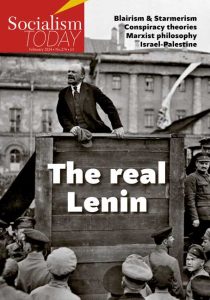
This year’s centenary of Vladimir Lenin’s death has already inevitably seen the publication of books seeking to distort his political legacy. He and Leon Trotsky are still the two historical figures most hated and feared by the capitalist ruling class because it was their political understanding and party-building methods that ensured the overthrow of capitalism and landlordism in the 1917 Russian revolution. Here we are reprinting an abridged review by PETER TAAFFE of a biography of Lenin that first appeared in Socialism Today in issue No.93 July-August 2005, outlining the real relevance of Lenin’s ideas and practice for the struggle for socialism internationally.
Lenin
By Christopher Read
Published by Routledge, 2005
This book is not exactly in the same genre as recent ‘monumental’ histories by ‘modern’ historians like Richard Pipes or Orlando Figes, seeking to destroy the real lessons of the Russian revolution and of the great figures involved in what was the greatest social overturn in history. It is much more subtle but, in some ways, more deadly in distorting the real lessons of Lenin’s life, his role in the construction of the Bolshevik party and, as leader with Trotsky, of the October revolution.
The author at least appears to have examined Lenin’s collected works. The book is therefore full of many excellent quotes which explain Lenin’s ideas at each stage in his development and that of the working-class movement of Russia. But even when Read makes a correct point about Lenin’s ideas, it is usually quickly followed by a disclaimer. In general, he condemns Lenin with faint praise.
Read more